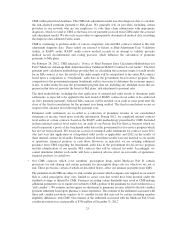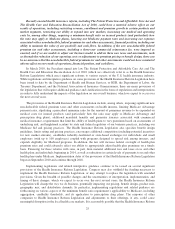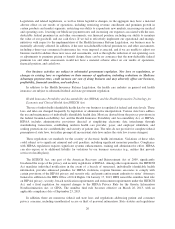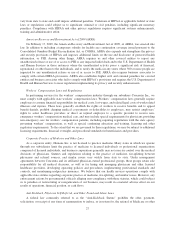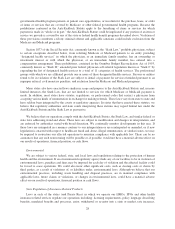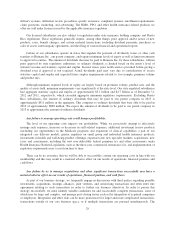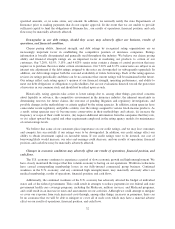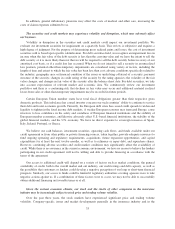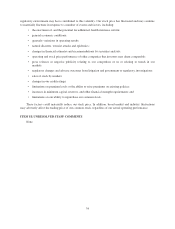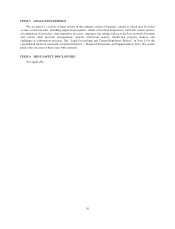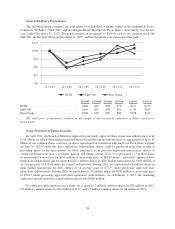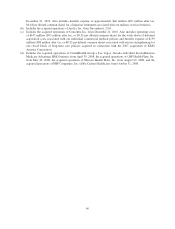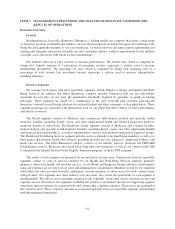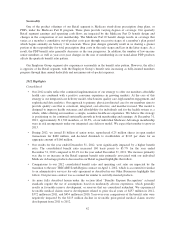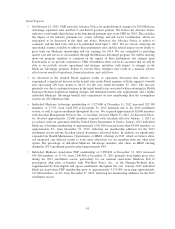Humana 2012 Annual Report Download - page 43
Download and view the complete annual report
Please find page 43 of the 2012 Humana annual report below. You can navigate through the pages in the report by either clicking on the pages listed below, or by using the keyword search tool below to find specific information within the annual report.In addition, general inflationary pressures may affect the costs of medical and other care, increasing the
costs of claims expenses submitted to us.
The securities and credit markets may experience volatility and disruption, which may adversely affect
our business.
Volatility or disruption in the securities and credit markets could impact our investment portfolio. We
evaluate our investment securities for impairment on a quarterly basis. This review is subjective and requires a
high degree of judgment. For the purpose of determining gross realized gains and losses, the cost of investment
securities sold is based upon specific identification. For debt securities held, we recognize an impairment loss in
income when the fair value of the debt security is less than the carrying value and we have the intent to sell the
debt security or it is more likely than not that we will be required to sell the debt security before recovery of our
amortized cost basis, or if a credit loss has occurred. When we do not intend to sell a security in an unrealized
loss position, potential other-than-temporary impairments are considered using variety of factors, including the
length of time and extent to which the fair value has been less than cost; adverse conditions specifically related to
the industry, geographic area or financial condition of the issuer or underlying collateral of a security; payment
structure of the security; changes in credit rating of the security by the rating agencies; the volatility of the fair
value changes; and changes in fair value of the security after the balance sheet date. For debt securities, we take
into account expectations of relevant market and economic data. We continuously review our investment
portfolios and there is a continuing risk that declines in fair value may occur and additional material realized
losses from sales or other-than-temporary impairments may be recorded in future periods.
Certain European Union member states have total fiscal obligations greater than their respective gross
domestic products. This imbalance has caused investor concern over such countries’ ability to continue to service
their debt and foster economic growth. Currently, the European debt crisis has caused credit spreads to widen and
liquidity to tighten in the fixed income debt markets. A weaker European economy may transcend Europe, cause
investors to lose confidence in the safety and soundness of European financial institutions and the stability of
European member economies, and likewise adversely affect U.S.-based financial institutions, the stability of the
global financial markets, and the U.S. economy. We have no direct exposure to sovereign issuances of Spain,
Italy, Ireland, Portugal, or Greece.
We believe our cash balances, investment securities, operating cash flows, and funds available under our
credit agreement or from other public or private financing sources, taken together, provide adequate resources to
fund ongoing operating and regulatory requirements, acquisitions, future expansion opportunities, and capital
expenditures for at least the next twelve months, as well as to refinance or repay debt, and repurchase shares.
However, continuing adverse securities and credit market conditions may significantly affect the availability of
credit. While there is no assurance in the current economic environment, we have no reason to believe the lenders
participating in our credit agreement will not be willing and able to provide financing in accordance with the
terms of the agreement.
Our access to additional credit will depend on a variety of factors such as market conditions, the general
availability of credit, both to the overall market and our industry, our credit ratings and debt capacity, as well as
the possibility that customers or lenders could develop a negative perception of our long or short-term financial
prospects. Similarly, our access to funds could be limited if regulatory authorities or rating agencies were to take
negative actions against us. If a combination of these factors were to occur, we may not be able to successfully
obtain additional financing on favorable terms or at all.
Given the current economic climate, our stock and the stocks of other companies in the insurance
industry may be increasingly subject to stock price and trading volume volatility.
Over the past three years, the stock markets have experienced significant price and trading volume
volatility. Company-specific issues and market developments generally in the insurance industry and in the
33


